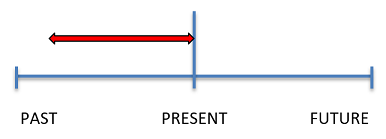The present perfect is formed with the present tense of “have” and the “past participle” of the verb you want to use. For example:
“Have you been to Italy?”
“I have recently started jogging in the morning.”
- talking about past experiences
- for something that began in the past and is still true
- describing changes.

Using the Present Perfect Tense in Business Situations
Situation 1: Talking about Profits, Sales Results, and Work Experience.
Present perfect is used to talk about unfinished actions that started in the past and continue to the present.
In this case, you will find yourself using the present perfect when answering “how long” questions, and describing sales/costs/profits/revenues for a particular period until the present moment.
Examples:
I’ve worked here for five years.
Profits have increased by 10% since Mark has been the Brand Manager.
Sales have bounced back this month.
How long have you worked in the banking sector for?
Situation 2: Talking about Business Trips and Company situations.
Present perfect is used to talk about past experiences without saying when something happened in the past.
Examples:
Our company has been through some tough periods. Fortunately today, though, we’re thriving.
I’ve already been to Tokyo on business and I love the city and its’ people.
*Note: If you say when something happened in the past, use the past simple. For example, “I went to Tokyo on business in 2015.”
Situation 3: Talking about Recent Changes to Plans.
Present perfect to talk about a finished action (when something has recently happened) with a result in the present.
In this case, the second clause in the sentence often begins with “so” and then describes the result of the past action.
Examples:
Unfortunately, David has missed his connecting flight, so he can’t be here with us today.
I’ve lost the file with my presentation slides, so I’ll have to do them all again.
Situation 4: Talking about Clients and Sales.
Present perfect with unfinished time words or expressions. Typical unfinished time words and expressions include, “this week”, “this month”, “today.”
Examples:
I’ve visited three of our major clients this week.
How many units have we sold this month?
*Note: When you use past time words, such as, “yesterday”, “last week”, “last year”, you must use the past simple tense. For example, “Last month we sold 10,000 units.”
Situation 5: Talking about Durations of Job Positions and Lengths of Time with a Relation to the Present.
Present perfect is used to describe an unfinished action with ‘Since’ and ‘For’.
Use ‘since’ with a fixed time in the past (2015, 5th May, last year), and we use ‘for’ with a period of time (5 hours, six months, ten years,).
Examples:
We’ve been located here since 1990.
She’s been the HR Director since January.
I’ve known the client for 3 years.
He’s been the CEO for 6 months.
Situation 6: Talking about Recent News and Business Updates.
Present perfect is used to talk about something that happened recently.
Often used with “just “,”yet”, “already”, “recently.”
Examples:
The CEO has just quit.
I’ve already had my assessment with HR.
Have you got the sell-out results back yet?
Our stock price has surged recently.